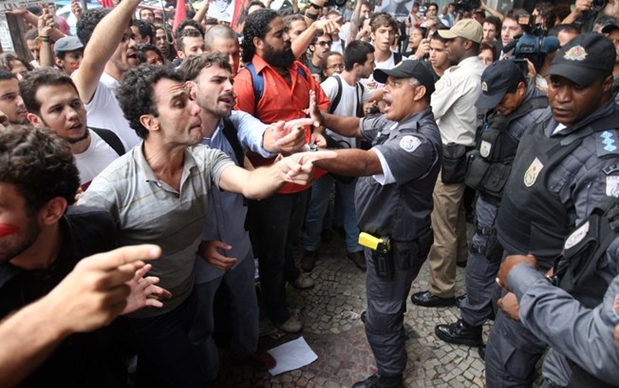Over the last years Brazil passed through an important period of reflexion regarding its authoritarian past, in a Transitional Justice process led by the National Truth Commission (CNV). The CNV was established (Law nº 12.528/2011) to investigate gross human rights violations perpetrated by the military regime from 1964 to 1988. Before the CNV, which lasted from 2012 to 2015, other important transitional justice mechanisms were created - and are still operating -, especially in the field of reparations for victims, like the Amnesty Commission, created in 2001.
Although the CNV did not have judicial powers, its mandate was very broad, allowing not only the investigation of serious human rights violations, but the political background of the coup, the scrutiny of the former State structures and the identity of perpetrators behind atrocities. On December 2015 the Commission presented its final report. The document have consolidated a critical perspective over the decades of military regime and formally acknowledged human rights offenses, especially uncountable cases of torture and the execution of 434 persons between deaths and forced disappearances.
Reproducing silence
The work developed by the CNV also revealed some difficulties in dealing with the past in Brazil, not only because of the validy of the self-amnesty law approved by the regime (Law.º 6.687/79), what surely reflects contradictions within Brazilian society and its efforts to develop democracy. This was especially evidenced by the way that CNV has marginalized the analysis of systematic human rights violation committed against vulnerable sections of society like indigenous, peasants, people who used to live in slums, women, activists of the black power movement, homosexuals etc.
All these groups were seriously stricken by the regime and kept suffering violence after the end of the military regime. Yet rather than highlight what happened to them, apparently the CNV decided to exclude it from the final report, including only a few of them at the attached volume of the final document, where the investigations were not supported by all of the Commission members. This reveals not only the problems of acknowledging the State responsibility in those crimes, but also how they were not priorities to CNV. With this behavior, the Commission did not acknowledged the killing of more de 2.000 indigenous from the ethnic group Waimiri-Atroari in Amazon or thousands of people who suffered with policies that took massive forced eviction in slums of Rio de Janeiro during the regime, like in Favela do Esqueleto, for instance.
Late transition, late democracy
Another important discussion that was overlooked by CNV was the late transition process itself and the shameful rates of serious human rights violation in the country during democracy. Although the CNV was created 24 years after the end of the regime, it did not debate the human rights offenses over the last decades and its relation with the authoritarian past. In that sense, it should have been important for the public opinion to clearly understand the relation between past and current violence, in order to support non-repetition measures on institutional sphere. The Commission should have dedicated more room to discuss, for example, the boom of violence in Brazil after 1988, that reached 44.861 homicides only in 2014. On the period of 20 years of democracy, homicides committed with the use of firearms increased 592,8%. At the same time, the Brazilian police became one of the more lethal police forces in the world. On the last 10 years, only the State Military Police of São Paulo killed 5.097 people, three times higher than latin american guerrillas like the FARC-EP and ELN in Colombia, that combined made 1.256 victims on the same period.
Permanent truths
Finally, unfortunately the CNV did not paved a clear way to continuity for transitional justice in Brazil. Although there was a recommendation at the final report for the creation of a monitoring organism, this was a very confuse definition that never came to practice. At the same time, despite the great expectation for the creation of Memory Sites, they were barely mentioned as a possibility on the final report. Rather than encouraging the memorialization of different sites on emblematic addresses around the country, supporting local and permanent debates over transitional justice after the end of the Truth Commission, the CNV mentioned the creation of a single Memory Museum in Brasília, not designating a specific place.
Pushing Democracy
Despite these criticism, the implementation of the Commission was important to start debates that are to be evolved and, hopefully, will be assimilated by State institutions in the future. After the intensification of the truth seeking process, there are many activists, civil society organizations and scholars intent to deepen the investigations concerning the impact of the authoritarian regime on vulnerable sections of society, what might be important to bring new dimensions of the damage caused by the regime and also to bring these groups to the struggle for truth, justice and remembrance. At the same time, there is a lively network of activist striving for the creation of memory sites in different parts of the country, memorializing former centers of torture or the headquarters of the former secret police, like the DOPS building in Rio de Janeiro or the DOI-Codi in São Paulo.
Considering the late transitional justice process in Brazil and the lack of debate on human rights offenses in democracy, new transitional practices sensitive to this questions are being created, like the Parliament Truth Commission ‘Mães de Acari”, on the parliament of Rio de Janeiro, for instance. New perspectives on truth seeking initiatives might help to democratize public policies in Brazil, especially issues like citizen security, militarization, drug policy, criminal law, prison system and other many current sources of institutional violence. From now on the struggle in Brazil is to democratize the truth seeking process itself, otherwise the past will linger, what is no longer possible for the people from lower classes who keep surviving under the silence and lethality of State’s authoritarian policies.
Berlin Seminar: Truth, Justice and Remembrance
JusticeInfo is publishing articles and testimonies from the participants to the Berlin Seminar of the Robert Bosch Stiftung, a partner of our website.
All over the world, societies suffer from traumatic experiences in wars and conflicts. The Berlin Seminar of the Robert Bosch Stiftung brings peace actors from (post-) conflict societies to Germany’s capital to work towards an appropriate approach to addressing violence in their countries. The participants discuss with experts and visit sites of memory. Furthermore, they peer-consult each other and exchange best practices to strengthen their abilities for conflict transformation. The belief is that lasting peace is only possible if the legacy of conflicts is dealt with in an inclusive and constructive manner.
Find more information here





